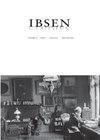Review
IF 0.1
0 THEATER
引用次数: 1
Abstract
This book is a polemic response to what the author considers to be a misleading tradition among literary historians regarding the family background of Henrik Ibsen. Jørgen Haave is himself a literary scholar, who has previously published articles about biographical aspects regarding Henrik Ibsen and his works, but this is his first historical rather than literary work on this theme. In the introductory chapter, Haave gives a short evaluation of the previous biographical works about Ibsen, and he criticizes his predecessors for an almost mythological approach in exaggerating how miserable his father, Knud Ibsen’s career was, from being an upstart merchant to ending up as a bankrupted alcoholic. He finds one methodological approach in previous research especially problematic: that most of his predecessors have used Henrik Ibsen’s works as sources for information about his childhood. Haave acknowledges that in the last 15 years, some authors have given a far less negative evaluation of Ibsen’s background, namely Ivo de Figueiredo and Jon Nygaard, noting that Figueiredo attempts to rehabilitate Knud Ibsen, and Nygaard stresses the prominence of Ibsen’s ancestry. Haave does not however think Figueiredo has gone far enough in his rehabilitation. Nygaard has not written about Henrik Ibsen himself, but about his ancestors. This subject is important for Haave, but his review of Nygaard’s family history oddly enough is just a quote from the blurb on the book cover. Haave recognizes his debt to local historians and genealogists, but seems to be almost unaware of the significance of contributions from mainstream historians. This lack of respect for a field in which he is a newcomer has resulted in a systematic tendency to replace the traditional overly评审
这本书是对作者认为文学历史学家中关于亨里克·易卜生家庭背景的误导传统的争论性回应。约尔根·哈夫本人是一位文学学者,他之前曾发表过关于亨里克·易卜生及其作品传记方面的文章,但这是他第一部关于这一主题的历史而非文学作品。在引言一章中,Haave对之前关于易卜生的传记作品进行了简短的评价,他批评他的前任们用近乎神话的方式夸大了他的父亲Knud Ibsen的职业生涯是多么悲惨,从一个暴发户商人到最终成为一个破产的酒鬼。他发现以前的研究中有一种方法论方法特别有问题:他的大多数前任都使用亨里克·易卜生的作品作为关于他童年的信息来源。Haave承认,在过去的15年里,一些作者对易卜生的背景给出了远没有那么负面的评价,即Ivo de Figueiredo和Jon Nygaard,并指出Figueire多试图恢复克努德·易卜生,而Nygaard强调易卜生祖先的重要性。然而,哈维认为菲格雷多在康复方面做得还不够。尼加德写的不是易卜生本人,而是他的祖先。这个主题对Haave来说很重要,但奇怪的是,他对Nygaard家族史的评论只是引用了封面上的简介。Haave承认他对当地历史学家和家谱学家的亏欠,但似乎几乎没有意识到主流历史学家的贡献的重要性。这种对他所处领域的不尊重导致了一种系统性的倾向,即取代传统的过度
本文章由计算机程序翻译,如有差异,请以英文原文为准。
求助全文
约1分钟内获得全文
求助全文

 求助内容:
求助内容: 应助结果提醒方式:
应助结果提醒方式:


